一般现在时三单动词的变化规则及练习题
小学英语一般现在时三单动词的变化规则及练习题

在句子中,一般现在时三单动词的变化规则可以用来描述事实、表达观点 或传达信息。
通过使用一般现在时三单动词的变化规则,可以使句子更加简洁、明了, 易于理解。
在英语学习中,掌握一般现在时三单动词的变化规则在实际中的应用非常 重要,可以提高语言表达能力。
一般现在时三单 动词的变化练习
题
单选练习题
一般现在时态中,动词第三人称单数的变化规则是:A. 动词原形 B. 动词+s C. 动词+es D. 动词+ing
下列句子中,动词形式正确的是:A. He like playing basketball B. She goes to school at 7:00 every day C. They like to eat apples D. We don't like to play in the rain
在日常交流中的应用
描述日常行为和习惯
表达经常发生的动作或状态
描述事物的性质和特征
表达个人的喜好和意愿
在写作中的应用
描述日常行为和习惯
表达个人观点和喜好
描述事件和经历
编写故事和虚构情境
感谢您的观看
汇报人:XX
下列句子中,动词形式不正确的是:A. He plays basketball every day B. She eats an apple every morning C. They like eat apples D. We don't like to play in the rain
下列句子中,动词形式正确的是:A. He doesn't like to eat vegetables B. She doesn't like playing the piano C. They don't like to read books D. We don't like eating apples
动词第三人称单数的变化规则及练习

动词第三人称单数的变化规则及练习一、使用情况:在一般现在时中,当主语是第三人称单数时,谓语动词要用第三人称单数形式,即常在动词原形后加-s或-es。
(标志词usually often always sometimes never every等)二、变化规则1、直接在动词后+s例如:like- likes play-plays2、以s, x, sh, ch, 接尾的动词:+es例如:wash-washes3、以辅音+o接尾的动词:+es例如:go-goes4、以辅音字母+y接尾的动词:变y为i+es例如:fly-flies以元音字母+y接尾的动词后+s例如:play-plays5、除上述规律外,还应注意下面三点:1)动词have ,遇到主语是第三人称单数时,要用has;动词be 的第三人称单数形式是is。
2)含有动词第三人称单数形式的句子变否定句时,要用doesn't + 动词原形,如:He goes to school at six in the morning. (变否定句)→He doesn't go to school at six in the morning.3)对含有动词第三人称单数形式的句子提问时,要用助动词does如:She goes home at five every day. (对划线部分提问)→When / What time does she go注意:不规则变化:have-----has,be-------is,do-----doesI 写出下列动词的第三人称单数(-s)和现在分词(-ing) godoplayjumpswimrunputsingdancecomegethaveflystudyreadwritelookdrinkeatwalklikeII选择1.Ben_____a new book.A. haveB. hasC. havesD. were2.Ben and Mary some books.A. haveB. hasC. areD. were3.I some stories every day.A. haveB. hasC. areD. were4.I __________ ice cream.A.likeB.likesC.likingD.likees5. Kitty__ English every dayA.readB.readesC.readingD.reads6.A man _____in front of his car.A.walkB.walksC.walkingD.work7.Sam’s bicycle ______a bell.A.have B has C.having D.is having8.I every dayA.swimB.swimsC.swimingD.swimes9.He his homework every day.A.doesB.doC.areD.is10. I ________ my homework every day.A.doB.isC.doesD.are11.They ________ their homework every day.A. doB.doesC. isD.are11.Lucy_______with her hands.A.touchB.touchingC.touchesD.touchs12.Superdog________the boysA.seeB.seesC.seeingD.ses13.Supergirl and Superdog______them.A.savesB.saveC.savingD.is saving14.Jack_______their cow.A.sellsB.sellC.sellingD.are selling15.Jack______up the beanstalk.A.getsB.getC.climbD.climbs16.The giant ______boys.A.eatingB.don’t eatC.eatsD.eat17.The goose_______golden eggs.yysyedyes17.The woman_______the beanstalk.A.cutB.cuttingC.are cutD.cuts18.Her mother ______the beanstalk.A.takeB.is take Ctakes D. taking19Jack andher mother _____happerA.doesB.areC.isD. have20.He____the beans in the ground.A.buyB.putsC.putD.buys二.填空:1.She ______(do) homework by herself.2.Jack ______(go) home by bike.3.The giant______(climb) up the beanstalk.4.Her mum ______(run) to the goose.5.He______(do not)like apple.6,Sam______(put) it under his arm.7.The boy_______(chase) it.8.Kitty______(watch)TV everyday.9.He______(feed)them at 8:00 in the morning.10.When ______(do)he get up?11.Grandma Wang___(live) in Pudong.12.The girls___(give) the key to Grandpa.13.That key ______(open) the old box.14.She ______(say) “I like these puppets”.15.What_____(do)Alice find?16.Which toy_____(do) she like?17.He doesn’t______(know)her name.18.John can’t_______(find) his watch.19.Where _____(do)Grandma live?20.How does he______(go)to the post office?三、请看下面两组句子,注意区分他们的共同点和不同点。
一般现在时动词第三人称单数变化规则讲义与试题
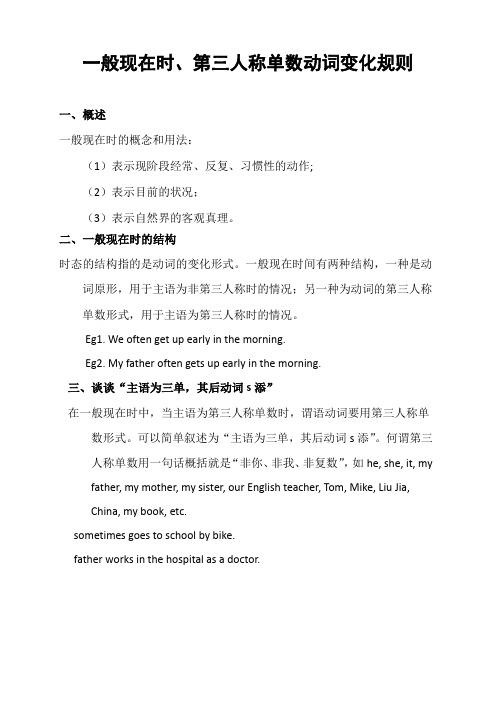
一般现在时、第三人称单数动词变化规则一、概述一般现在时的概念和用法:(1)表示现阶段经常、反复、习惯性的动作;(2)表示目前的状况;(3)表示自然界的客观真理。
二、一般现在时的结构时态的结构指的是动词的变化形式。
一般现在时间有两种结构,一种是动词原形,用于主语为非第三人称时的情况;另一种为动词的第三人称单数形式,用于主语为第三人称时的情况。
Eg1. We often get up early in the morning.Eg2. My father often gets up early in the morning.三、谈谈“主语为三单,其后动词s添”在一般现在时中,当主语为第三人称单数时,谓语动词要用第三人称单数形式。
可以简单叙述为“主语为三单,其后动词s添”。
何谓第三人称单数用一句话概括就是“非你、非我、非复数”,如he, she, it, my father, my mother, my sister, our English teacher, Tom, Mike, Liu Jia,China, my book, etc.sometimes goes to school by bike.father works in the hospital as a doctor.四、一般现在时的肯定句中,主语为第三人称单数的动词变化主要体现在词尾的变化上,其规律为:(与名词变成复数的变法大致相同。
)五、一般现在时的句子转换(1)当句子中有be动词或情态动词时,则把be动词或情态动词(can,could 等等)提到主语的前面变成一般疑问句;在be动词或情态动词后面加not变成否定句.例:①陈述句:She is a student.一般疑问句→Is she a student否定句→She is not a student.②陈述句:I can swim.一般疑问句→Can you swim否定句→I can not swim.(2)当句子中即没有be动词,也没有情态动词时,则在主语前加助动词do (you,以及复数), does(单数she,he,it)变成一般疑问句;在主语后谓语动词前加助动词don’t(I,you,以及复数), doesn’t(单数she,he,it)变成否定句,助动词后的动词要变成动词原形。
小学英语一般现在时三单动词的变化规则及练习题
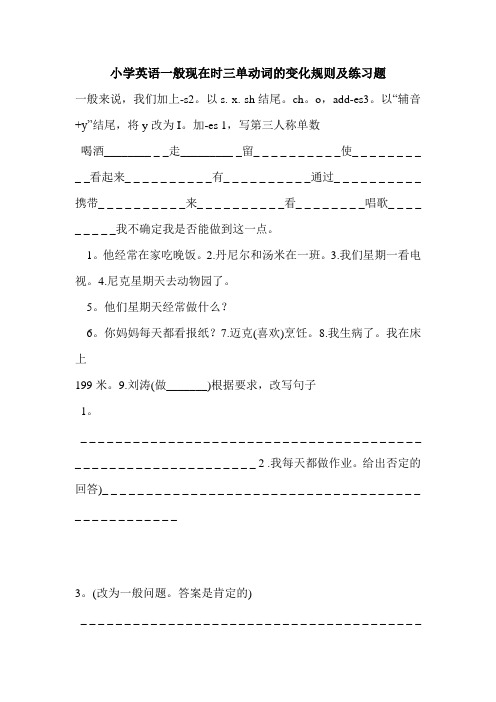
小学英语一般现在时三单动词的变化规则及练习题一般来说,我们加上-s2。
以s. x. sh结尾。
ch。
o,add-es3。
以“辅音+y”结尾,将y改为I。
加-es 1,写第三人称单数喝酒________ _ _走_________ _留_ _ _ _ _ _ _ _ _ _使_ _ _ _ _ _ _ _ _ _看起来_ _ _ _ _ _ _ _ _ _有_ _ _ _ _ _ _ _ _ _通过_ _ _ _ _ _ _ _ _ _携带_ _ _ _ _ _ _ _ _ _来_ _ _ _ _ _ _ _ _ _看_ _ _ _ _ _ _ _唱歌_ _ _ _ _ _ _ _ _我不确定我是否能做到这一点。
1。
他经常在家吃晚饭。
2.丹尼尔和汤米在一班。
3.我们星期一看电视。
4.尼克星期天去动物园了。
5。
他们星期天经常做什么?6。
你妈妈每天都看报纸?7.迈克(喜欢)烹饪。
8.我生病了。
我在床上199米。
9.刘涛(做_______)根据要求,改写句子1。
_ _ _ _ _ _ _ _ _ _ _ _ _ _ _ _ _ _ _ _ _ _ _ _ _ _ _ _ _ _ _ _ _ _ _ _ _ _ _ _ _ _ _ _ _ _ _ _ _ _ _ _ _ _ _ _ _ _ _ _ 2 .我每天都做作业。
给出否定的回答)_ _ _ _ _ _ _ _ _ _ _ _ _ _ _ _ _ _ _ _ _ _ _ _ _ _ _ _ _ _ _ _ _ _ _ _ _ _ _ _ _ _ _ _ _ _ _ _3。
(改为一般问题。
答案是肯定的)_ _ _ _ _ _ _ _ _ _ _ _ _ _ _ _ _ _ _ _ _ _ _ _ _ _ _ _ _ _ _ _ _ _ _ _ _ _ __ _ _ _ _ _ _ _ _ _ _ _ _ _ _ 4。
艾米喜欢玩电脑游戏。
给出否定的回答)_ _ _ _ _ _ _ _ _ _ _ _ _ _ _ _ _ _ _ _ _ _ _ _ _ _ _ _ _ _ _ _ _ _ _ _ _ _ _ _ _ _ _ _ _ _ _ _5 .我们星期天去上学(改为否定句)_ _ _ _ _ _ _ _ _ _ _ _ _ _ _ _ _ _ _ _ _ _ _ _ _ _ _ _ _ _ _ _ _ _ _ _ _ _ _ _ _ _ _ _ _ _ _ _ _ _ _ _ _ _ _ _ _ _ _ _ _ _ _ _ _ _ _ _ _ _ _ _ _ _ _ _ _ _ _ _ _ _ _ _ _ _ _ _ _ _ _ _ _ _ _ _ _ _ _ _ _ _ _ _ _ _ _ _ _ _ _ _ _ _ _ _ _ _ _ _ _ _ _ _ _ _ _ _ _ _ _ _ _ _ _ _ _ _ _ _ _ _ _ _ _ _ _ _ _ _ _ _ _ _ _ _ _ _ _ _ _ _ _ _ _ _ _ _ _ _ _ _ _ _ _ _ _ _ _ _ _ _ _ _ _ _ _ _ _ _ _ _ _ _ _ _ _ _ _ _ _ _ _ _ _ _ _ _ _ _ _ _ _ _ _ _ _ _ _ _ _ _ _ _ _ _ _ _ _ _ _ _ _ _ _ _ _ _ _ _ _ _ _ _ _ _ _ _ _ _ _ _ _ _ _ _ _ _ _ _ _ _ _ _ _ _ _ 2。
第三人称单数及动词第三人称单数形式变化规则(附练习及答案)

第三人称单数及动词第三人称单数形式变化规则Ⅰ. 第三人称单数主语归纳在一般现在时中,当主语是第三人称单数时,谓语动词要用第三人称单数形式,即常在动词原形后加-s或-es。
现将第三人称单数主语归纳总结如下:Ⅱ. 动词第三人称单数形式变化规则练习及答案一、写出下列动词的第三人称单数。
drink _______ go _______ stay ________ make ________ pass _______ carry_______ come ________ watch _______ fly ________ study_______ brush _______ teach _______ wash_______ guess______ play _______ finish _______二、用括号内动词的适当形式填空。
1. He often ________ (have) dinner at home.2. We _______ (not watch) TV on Monday.3. Nick _______ (not go) to the zoo on Sunday.4. ______ they ________ (like) the World Cup?5. What _______they often _______ (do) on Saturdays?6. _______ your parents _______ (read) newspapers every day?7. The girl _______ (teach) us English on Sundays.8. She and I ________ (take) a walk together every evening.9. There ________ (be) some water in the bottle.10. My aunt _______ (look) after her baby carefully.11. The child often _______ (watch) TV in the evening.12. Su Hai and Su Yang _______ (have) eight lessons this term.答案:一、写出下列动词的第三人称单数。
第三人称单数及动词第三人称单数形式变化规则(附练习及答案)(可打印修改)

第三人称单数及动词第三人称单数形式变化规则Ⅰ. 第三人称单数主语归纳在一般现在时中,当主语是第三人称单数时,谓语动词要用第三人称单数形式,即常在动词原形后加-s或-es。
现将第三人称单数主语归纳总结如下:一、人称代词he, she, it是第三人称单数1. He likes cars. 他喜欢车。
2. She goes to school at seven. 她七点去上学。
3. It has a good name. 它有一个好名字。
二、单个人名、地名或亲朋好友等称呼作主语,是第三人称单数1. Lucy never throws rubbish on the floor. Pat从不在地板上扔垃圾。
2. Beijing is in China. 北京在中国。
3. Aunt Mary usually makes cakes. 玛丽阿姨经常做蛋糕。
三、单数可数名词作主语时,是第三人称单数。
1. A horse is a useful animal. 马是有用的动物。
2. This book is yours. 这本书是你的。
3. That car is red. 那辆小汽车是红色的。
四、不定代词someone, somebody, nobody, everything, something及指示代词this, that作主语时,是第三人称单数1. Everyone is here. 大家到齐了。
2. This is a pen. 这是一支钢笔。
3. That is an eraser. 那是一块橡皮擦。
五、不可数名词作主语时为第三人称单数。
1. The milk is in the glass. 牛奶在玻璃杯里。
2. The bread is very small. 那面包很小。
六、当数字或字母作主语时,看作第三人称单数1. "6" is a lucky number. "6"是个吉利数字。
初一英语一般现在时第三人称单数形式规则 练习题及答案
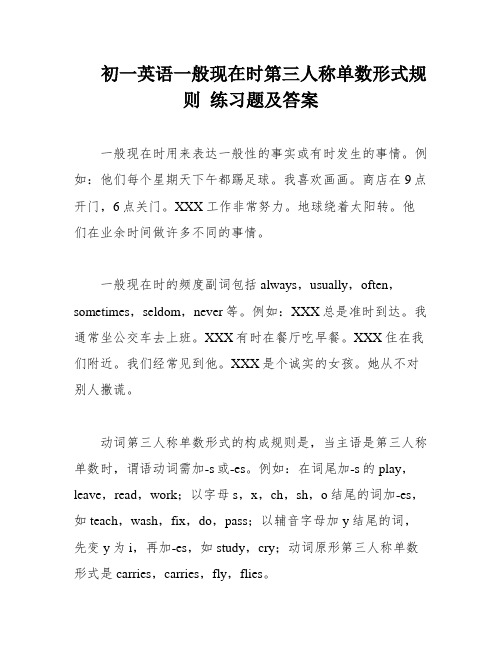
初一英语一般现在时第三人称单数形式规则练习题及答案一般现在时用来表达一般性的事实或有时发生的事情。
例如:他们每个星期天下午都踢足球。
我喜欢画画。
商店在9点开门,6点关门。
XXX工作非常努力。
地球绕着太阳转。
他们在业余时间做许多不同的事情。
一般现在时的频度副词包括always,usually,often,sometimes,seldom,never等。
例如:XXX总是准时到达。
我通常坐公交车去上班。
XXX有时在餐厅吃早餐。
XXX住在我们附近。
我们经常见到他。
XXX是个诚实的女孩。
她从不对别人撒谎。
动词第三人称单数形式的构成规则是,当主语是第三人称单数时,谓语动词需加-s或-es。
例如:在词尾加-s的play,leave,read,work;以字母s,x,ch,sh,o结尾的词加-es,如teach,wash,fix,do,pass;以辅音字母加y结尾的词,先变y为i,再加-es,如study,cry;动词原形第三人称单数形式是carries,carries,fly,flies。
练一:使用动词的正确形式boil,close,cost,like,meet,open,speak,XXX,wash。
例如:XXX会说四种语言。
1.XXX.2.We do not watch TV very often.3.How often do you wash your hair?4.Chris does not want to go to the cinema.5.Do you want to go out this evening?6.Does Ann live near here?1.Does Sara know a lot of people?2.I don't travel very often。
but I enjoy it.3.What time do you usually wake up in the morning?4.XXX't want to go to the party.5.Do you want to come with us to the park?6.Does Ann live in this neighborhood?7.Sara is familiar with a lot of people.8.Although I XXX。
六年级下册英语专项练习动词第三人称单数的变化规则 全国通用
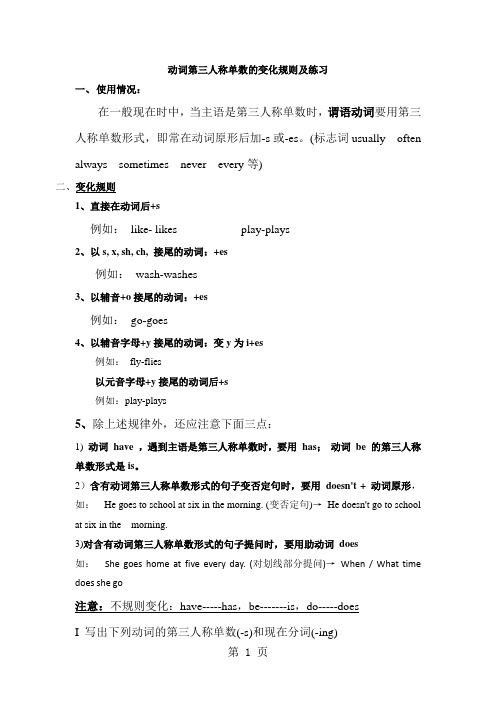
动词第三人称单数的变化规则及练习一、使用情况:在一般现在时中,当主语是第三人称单数时,谓语动词要用第三人称单数形式,即常在动词原形后加-s或-es。
(标志词usually often always sometimes never every等)二、变化规则1、直接在动词后+s例如:like- likes play-plays2、以s, x, sh, ch, 接尾的动词:+es例如:wash-washes3、以辅音+o接尾的动词:+es例如:go-goes4、以辅音字母+y接尾的动词:变y为i+es例如:fly-flies以元音字母+y接尾的动词后+s例如:play-plays5、除上述规律外,还应注意下面三点:1)动词have ,遇到主语是第三人称单数时,要用has;动词be 的第三人称单数形式是is。
2)含有动词第三人称单数形式的句子变否定句时,要用doesn't + 动词原形,如:He goes to school at six in the morning. (变否定句)→He doesn't go to school at six in the morning.3)对含有动词第三人称单数形式的句子提问时,要用助动词does如:She goes home at five every day. (对划线部分提问)→When / What time does she go注意:不规则变化:have-----has,be-------is,do-----doesI 写出下列动词的第三人称单数(-s)和现在分词(-ing)go do play jump swim run put sing dance come get have fly study read write look drink eat walk like II选择1.Ben_____a new book.A. haveB. hasC. havesD. were2.Ben and Mary some books.A. haveB. hasC. areD. were3.I some stories every day.A. haveB. hasC. areD. were4.I __________ ice cream.A.likeB.likesC.likingD.likees5. Kitty__ English every dayA.readB.readesC.readingD.reads6.A man _____in front of his car.A.walkB.walksC.walkingD.work7.Sam’s bicycle ______a bell.A.have B has C.having D.is having8.I every dayA.swimB.swimsC.swimingD.swimes9.He his homework every day.A.doesB.doC.areD.is10. I ________ my homework every day.A.doB.isC.doesD.are11.They ________ their homework every day.A. doB.doesC. isD.are11.Lucy_______with her hands.A.touchB.touchingC.touchesD.touchs12.Superdog________the boysA.seeB.seesC.seeingD.ses13.Supergirl and Superdog______them.A.savesB.saveC.savingD.is saving14.Jack_______their cow.A.sellsB.sellC.sellingD.are selling15.Jack______up the beanstalk.A.getsB.getC.climbD.climbs16.The giant ______boys.A.eatingB.don’t eatC.eatsD.eat17.The goose_______golden eggs.yysyedyes17.The woman_______the beanstalk.A.cutB.cuttingC.are cutD.cuts18.Her mother ______the beanstalk.A.takeB.is take Ctakes D. taking19Jack andher mother _____happerA.doesB.areC.isD. have20.He____the beans in the ground.A.buyB.putsC.putD.buys二.填空:1.She ______(do) homework by herself.2.Jack ______(go) home by bike.3.The giant______(climb) up the beanstalk.4.Her mum ______(run) to the goose.5.He______(do not)like apple.6,Sam______(put) it under his arm.7.The boy_______(chase) it.8.Kitty______(watch)TV everyday.9.He______(feed)them at 8:00 in the morning.10.When ______(do)he get up?11.Grandma Wang___(live) in Pudong.12.The girls___(give) the key to Grandpa.13.That key ______(open) the old box.14.She ______(say) “I like these puppets”.15.What_____(do)Alice find?16.Which toy_____(do) she like?17.He doesn’t______(know)her name.18.John can’t_______(find) his watch.19.Where _____(do)Grandma live?20.How does he______(go)to the post office?三、请看下面两组句子,注意区分他们的共同点和不同点。
一般现在时第三人称单数动词的变化规则

一般现在时第三人称单数动词的变化规则在一般现在时,第三人称单数的动词变化规则为在动词原形(原始形式)后加上-s或-es。
1.对于大多数动词,只需在词尾加上-s。
例如:
- He plays basketball every day.(他每天打篮球。
)
- She cooks dinner for her family.(她为家人做晚餐。
)
2. 如果动词以s、ss、sh、ch、x或o结尾,要在词尾加上-es。
例如:
- He washes his car every Sunday.(他每个星期天洗他的车。
)- The bird sings beautifully.(鸟儿唱得很美。
)
3. 对于以辅音字母+y结尾的动词,将y变为i,再加上-es。
例如:
- He flies to different countries for his job.(他飞到不同的国家工作。
)
- She tries her best in everything she does.(她在做任何事情时都尽力。
)
需要注意的是,有一些动词在第三人称单数时有不规则变化,例如:- He has a car.(他有一辆车。
- She does her homework every day.(她每天做作业。
)
- It is a beautiful day.(今天是个美好的日子。
)
此外,有些动词在第三人称单数时不变化,例如:
- He can swim very well.(他游泳游得很好。
)- She likes to read books.(她喜欢读书。
一般现在时主语三单的动词变化及练习

一般如今时主语单三人称时的动词变更【1 】①在一般如今时中,当主语为第三人称单数时,动词要用“s”型(即第三人称单数情势).②所谓动词“s”型的组成,与名词变复数类似,即:a)在动词尾直接加 s.如:play—plays, want—wants, work—works, know—knows, help—helps,get—getsb)以字母s.ss.x.ch.sh或o结尾的动词加es;如:guess—guesses, fix—fixes, teach—teaches, brush—brushes, go—goes,do—does,watch—watches,catch—catches c)以子音字母+y结尾的动词,先变y为i,再加es.如:study—studies,carry—carries,fly—flies,worry—worries第三人称单数演习一.请选出准确的答案:1. She (like / likes) to play football.2. He (like / likes) drinking milk.3. I (like / likes) to watch TV.4. We (like / likes) to play badminton.5. They (like / likes) to sing songs.6. She (read / reads) books every day.7. He (play / plays) computer games every day.8. It (listen / listens) to the radio every day.9. Linda (draw / draws) pictures every day.10. Jane and Linda (play / plays) football every day.二.请用动词的恰当情势填空.1.Let him _____(play)basketball.2.Everyone_____(know)what he really like.3.Those girls____(be)my sister.4.That girl_____(call)me every Sunday.5.How___(do)she_____(spell)the word?6. He________ TV every evening. (watch)7. We always ________ to school on foot. (go)8. Tom, with his classmates, often ______ football after school. (play)9. Your shoes _______ under the bed. (be)10. ______ here and ______ by me. (come, stand)11. His uncle usually _________ to work by bus. (go)12. I always ______ up at six in the morning.(get)13. John ________ like his father. (look)三.请用 have或has填空.1.I ________ a nice picture.2.He ________ a good friend.3.They _________ some kites.4.We ________ some flowers.5.She __________ a duck.6.My father __________ a new bike.7.Her mother _________ a vase.8.Our teacher _________ an English book.9.Our teachers _________ a basketball.10.Their parents __________ some story books.11.Nancy _______ many skirts.12.David ________ some jackets.13.My friends ________ a football.14.What do you ________ ?15.What does Mike ________ ?四.否认句:在动词前+doesn't或don't.1.She_____ _____(do)her homework every day.2.He_____ _____(live)in Shanghai.3.He_____ _____(need)a pair pf shoes.4.Danny_____ _____(see)the apple tree?5.She_____ _____(come)from America.6.The girl_____ _____(look)out of the window and sees many birds in the sky.五.Do照样Does我来选.1. [Do/Does]______ he watch TV at night? Yes he does.2. [Do/Does]______ you go to school everyday? No, I don’t.3. [Do/Does]______ Jack and Peter like apples?4. [Do/Does]______ Tina go swimming on Sunday?5. [Do/Does]______they play football? Yes, they ___[do/does].6. [Do/Does]______ we have a good teacher? Yes, we ____[do/does].7. [Do/Does]_____ they jump rope ? No, they ___[do not/does not].8. [Do/Does]_____your dog walk in the zoo?9. [Do/Does]____ I have a big nose? No, you _____[do not/does not].10. [Do/Does]____ your cats eat fish? Yes, they _____.[do/does].11. [Do/Does]_____ their mothers go shopping? No, they ____[do not/does not].12. I ___[do not/ does not] speak Japanese. [Do/Does] _____you speak Japanese?六.请用动词的恰当情势填空.1._____the desk_____(have)four legs?Yes,it does.2._____she____(do)her homework every day?Yes,she does.3._____he_____(live)in Jinan?No,he doesn't.4._____he_____(need)a pair of shoes?NO,he doesn't.5.Does Danny_____(see)the apple tree?6._____she_____(come)from America?Yes,she_____.7._____the girl_____(look)out of the window and sees many birds in the sky? No,she_____.8. Jenny runs home and_____(sit)on the chair?七.选择题:1. I _____ to school every day.A. goB. goesC. going2. He _____ teeth every morning.A. brushB. brushesC. brushing3. The birds_____ singing.A. likeB. likesC. like to4. What does Lily _____ doing?A. likeB. likesC. to5. _____ you like eating apples?A. DoB. DoesC. Doing6. _____ he swim every afternoon?A. DoB. DoesC. Doing7. Tom likes _____ in the classroom.A. singingB. singC. to singing8. –Does Sally like swimming?No, she .A. doB. doesC. doesn’t9. Peter and Mary _____ milk every day.A. drinkB. drinkingC. drinks10. _____ they read English every day?A. DoesB. AreC. Do八.把下列句子变成否认句:1. She draws pictures every day.2. We like playing football.九.把下列句子变成一般疑问句,并做确定答复.1. Linda swims every day.2. They like playing games.。
三单动词、现在分词的变化规则及练习题

三单动词的变化规则1.一般情况下,直接加-s2.以s. x. sh. ch. o结尾,加-es3.以“辅音字母+y”结尾,变y为i, 再加-es4、特殊情况have变has一般现在时用法专练:一、写出下列动词的第三人称单数drink ________ go _______ stay ________ make ________ look _________ have_______ pass_______ carry ____study_______ brush________ do_________ teach_______二、用括号内动词的适当形式填空。
1. He often ________(have) dinner at home.2. Daniel and Tommy _______(be) in Class One.3. We _______(not watch) TV on Monday.4. Nick _______(not go) to the zoo on Sunday.5. ______ they ________(like) the World Cup?6. What _______they often _______(do) on Saturdays?7. _______ your parents _______(read) newspapers every day?8. The girl _______(teach) us English on Sundays.9. She and I ________(take) a walk together every evening.10. There ________(be) some water in the bottle(瓶子) .11. Mike _______(like) cooking.12. They _______(have) the same hobby.13. My aunt _______(look) after her baby carefully. (look after 照顾、照看)14. You always _______(do) your homework well.15. I _______(be) ill. I’m staying in bed.16. She _______(go) to school from Monday to Friday.17. Liu Tao _______(do) not like PE.18. The child often _______(watch) TV in the evening.19. Su Hai and Su Yang _______(have) eight lessons this term.20. -What day _______(be) it today?It’s Saturday.三、按照要求改写句子1. Daniel watches TV every evening.(改为否定句)___________________________________________________2. I do my homework every day.(改为一般疑问句,作否定回答)____________________________________________________________________________________3. She likes milk.(改为一般疑问句,作肯定回答)_______________________________________________________________________________________________________________________________________________________________________________5. We go to school every morning.(改为否定句)_______________________________________________________ 6. He speaks English very well.(改为否定句)______________________________________________________________________________________________________8. She is always a good student.(改为一般疑问句,作否定回答)________________________________________________________ ________________________________9、Simon and Daniel like going skating.(改为否定句)___________________________________________________五、改错(划出错误的地方,将正确的写在横线上)1. Is your brother speak English?__________________2. Does he likes going fishing?__________________3. He likes play games after class.__________________4. Mr. Wu teachs us English.__________________5. She don’t do her homework on Sundays. _________________现在分词变化规则:1 .一般情况下直接加ingthink---thinkingsleep---sleepingstudy---studyingspeak---speakingsay---saying2 .以不发音的字母e结尾的单词,去掉字母e,再加ingtake---takingleave---leavinghave---havingdance----dancingride----ridingwrite---writing※注意※这里的e必须不发音,若发音,则不能去掉,如see→seein g3.以重读闭音节结尾,呈现“辅,元,辅”结构的动词,先双写末尾的辅音字母,再加ing[要判断一个单词是否是重读闭音节,必须同时满足下列三个条件:]1、这个音节必须重读;2、这个单词结尾必须是“辅元辅”,即“辅音字母+元音字母+辅音字母”;3、在这个“辅元辅”中的元音字母必须发短音。
小学英语一般现在时三单动词的变化规则及练习题

一般现在时三单动词的变化规则及练习题1.一般情况下,直接加-s 2.以s. x. sh. ch. o结尾,加-es 3.以“辅音字母+y”结尾,变y为i, 再加-es一、写出下列动词的第三人称单数drink ________ go _______ stay ________ make ________ look _____ ____ have_______ pass_______ carry ____ come________ watch___ ___ sing_______ fly ________ study_______ brush________ do_______ __ teach_______二、用括号内动词的适当形式填空。
1. He often ________(have) dinner at home.2. Daniel and Tommy ___ ____(be) in Class One.3. We _______(not watch) TV on Monday.4. N ick _______(not go) to the zoo on Sunday.5. What _______they often _______(do) on Sundays?6. _______ your mother _______(read) newspapers every day?7. Mike _______(like) cooking. 8. I _______(be) ill. I’m in bed. 9. Liu Tao _______(do) not like PE. 10. The child often ____ ___(watch) TV in the evening.三、按照要求改写句子1. He watches TV every evening.(改为否定句)___________________________________________________2. I do my homework every day.(改为一般疑问句,作否定回答) ________________________________________________3. She likes books.(改为一般疑问句,做肯定回答)_______________________________________________________ 4. Amy likes playing computer games.(改为一般疑问句,作否定回答) _______________________________________________________ _5. We go to school on Sundays.(改为否定句)_______________________________________________________四、改错(划出错误的地方,将正确的写在横线上)1. Is your brother like English? __________________2. Does he likes swimming? __________________3. He likes play games. __________________4. She don’t do her homework on Sundays. _________________五、把句子补充完整。
一般现在时主语三单的动词变化与练习
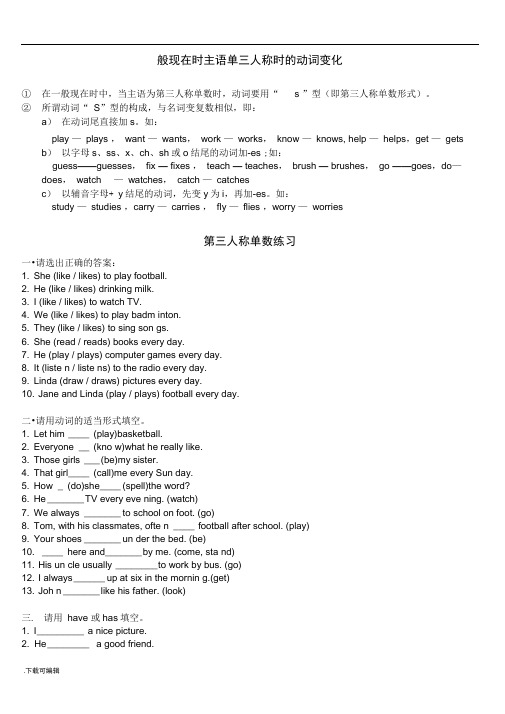
般现在时主语单三人称时的动词变化①在一般现在时中,当主语为第三人称单数时,动词要用“s ”型(即第三人称单数形式)。
②所谓动词“ S”型的构成,与名词变复数相似,即:a)在动词尾直接加s。
如:play —plays ,want —wants,work —works,know —knows, help —helps,get —gets b)以字母s、ss、x、ch、sh或o结尾的动词加-es ;如:guess——guesses,fix — fixes ,teach — teaches,brush — brushes,go ——goes,do—does,watch —watches,catch —catchesc)以辅音字母+ y结尾的动词,先变y为i,再加-es。
如:study —studies ,carry —carries ,fly —flies ,worry —worries第三人称单数练习一•请选出正确的答案:1. She (like / likes) to play football.2. He (like / likes) drinking milk.3. I (like / likes) to watch TV.4. We (like / likes) to play badm inton.5. They (like / likes) to sing son gs.6. She (read / reads) books every day.7. He (play / plays) computer games every day.8. It (liste n / liste ns) to the radio every day.9. Linda (draw / draws) pictures every day.10. Jane and Linda (play / plays) football every day.二•请用动词的适当形式填空。
一般现在时-动词三单练习
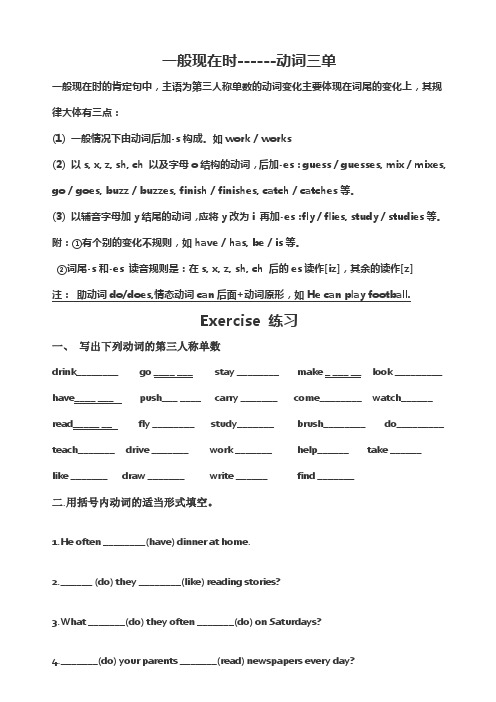
一般现在时------动词三单一般现在时的肯定句中,主语为第三人称单数的动词变化主要体现在词尾的变化上,其规律大体有三点:(1) 一般情况下由动词后加-s构成。
如work / works(2) 以s, x, z, sh, ch 以及字母o结构的动词,后加-es:guess / guesses, mix / mixes, go / goes, buzz / buzzes, finish / finishes, catch / catches等。
(3) 以辅音字母加y结尾的动词,应将y改为i 再加-es:fly / flies, study / studies等。
附:①有个别的变化不规则,如have / has, be / is等。
②词尾-s和-es 读音规则是:在s, x, z, sh, ch 后的es读作[iz],其余的读作[z]Exercise 练习一、写出下列动词的第三人称单数drink________ go ____ ___ stay ________ make _ ___ __ look _________ have____ ___ push___ ____ carry _______ come________ watch______ read_____ __ fly ________ study_______ brush________ do_________ teach_______ drive _______ work _______ help______ take ______like _______ draw _______ write ______ find _______二.用括号内动词的适当形式填空。
1.He often ________(have) dinner at home.2.______ (do) they ________(like) reading stories?3.What _______(do) they often _______(do) on Saturdays?4._______(do) your parents _______(read) newspapers every day?5.The girl _______(teach) us English on Sundays.6.She and I ________(take) a walk together every evening.7.Mike _______(like) cooking.8.They _______(have) the same hobby.9.He can_______(do) his homework well.10.My father is a factory worker. He ______(make) toy cars.11.She _______(go) to school from Monday to Friday.12.The boy often _______(watch) TV in the evening.13.Su Hai and Su Yang _______(have) eight lessons this term.14.He _________(read) English every day.15.We _________(go)to school at seven in the morning.16.Mike________(go)to school at seven in the morning.17.My mother________(like) ______(go) shopping.18.I can ________(draw) many beautiful pictures.19.She_________(make) a model plane.20.Do you ________(like)_________(run)?。
第三人称单数及动词第三人称单数形式变化规则(附练习及答案)
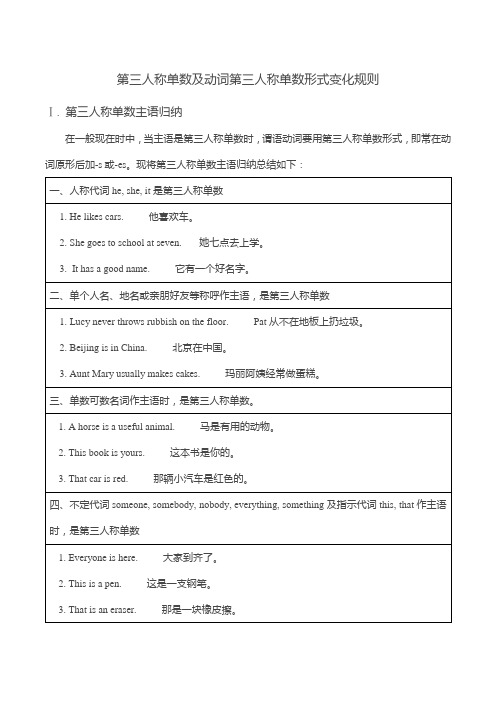
第三人称单数及动词第三人称单数形式变化规则Ⅰ. 第三人称单数主语归纳在一般现在时中,当主语是第三人称单数时,谓语动词要用第三人称单数形式,即常在动词原形后加-s或-es。
现将第三人称单数主语归纳总结如下:Ⅱ. 动词第三人称单数形式变化规则练习及答案一、写出下列动词的第三人称单数。
drink _______ go _______ stay ________ make ________ pass _______ carry_______ come ________ watch _______ fly ________ study_______ brush _______ teach _______ wash_______ guess______ play _______ finish _______二、用括号内动词的适当形式填空。
1. He often ________ (have) dinner at home.2. We _______ (not watch) TV on Monday.3. Nick _______ (not go) to the zoo on Sunday.4. ______ they ________ (like) the World Cup?5. What _______they often _______ (do) on Saturdays?6. _______ your parents _______ (read) newspapers every day?7. The girl _______ (teach) us English on Sundays.8. She and I ________ (take) a walk together every evening.9. There ________ (be) some water in the bottle.10. My aunt _______ (look) after her baby carefully.11. The child often _______ (watch) TV in the evening.12. Su Hai and Su Yang _______ (have) eight lessons this term.答案:一、写出下列动词的第三人称单数。
初一英语一般现在时第三人称单数变化规则单选题30题

初一英语一般现在时第三人称单数变化规则单选题30题1. Tom often ______ basketball after school.A.playB.playsC.playingD.to play答案:B。
本题考查一般现在时第三人称单数形式。
主语Tom 是第三人称单数,谓语动词要用plays。
选项 A 是动词原形;选项 C 是现在分词;选项D 是动词不定式。
2. My sister ______ her homework in the evening.A.doB.doesC.doingD.to do答案:B。
主语My sister 是第三人称单数,谓语动词要用does。
选项 A 是动词原形;选项 C 是现在分词;选项 D 是动词不定式。
3. He ______ to school by bus every day.A.goB.goesC.goingD.to go答案:B。
主语He 是第三人称单数,谓语动词要用goes。
选项A 是动词原形;选项C 是现在分词;选项D 是动词不定式。
4. The cat ______ fish.A.likeB.likesC.likingD.to like答案:B。
主语The cat 是第三人称单数,谓语动词要用likes。
选项 A 是动词原形;选项 C 是现在分词;选项 D 是动词不定式。
5. She ______ books in her free time.A.readB.readsC.readingD.to read答案:B。
主语She 是第三人称单数,谓语动词要用reads。
选项 A 是动词原形;选项C 是现在分词;选项D 是动词不定式。
6.She often helps her classmates. Her brother ______ helps his friends.A.alsoB.tooC.eitherD.neither答案:A。
本题考查副词辨析。
初中一般现在时与三单动词变化规则
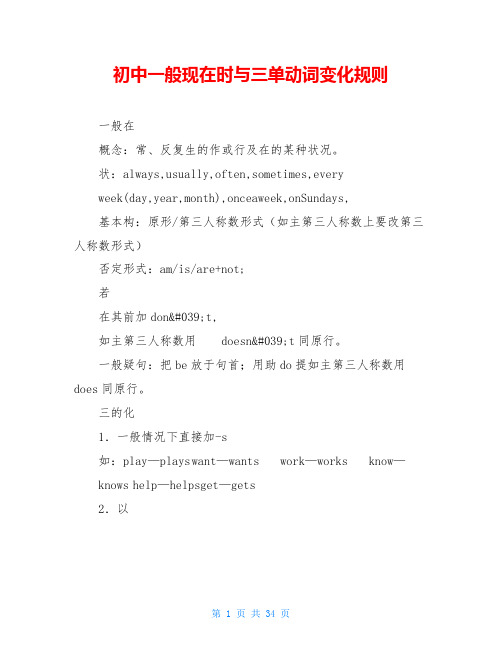
初中一般现在时与三单动词变化规则一般在概念:常、反复生的作或行及在的某种状况。
状:always,usually,often,sometimes,everyweek(day,year,month),onceaweek,onSundays,基本构:原形/第三人称数形式(如主第三人称数上要改第三人称数形式)否定形式:am/is/are+not;若在其前加don't,如主第三人称数用doesn't同原行。
一般疑句:把be放于句首;用助do提如主第三人称数用does同原行。
三的化1.一般情况下直接加-s如:play—plays w ant—wants work—works know—knows help—helpsget—gets2.以s.x.sh.ch.o尾加-es如:guess—guessesfix—fixesteach—teachesbrush—brushes go—goesdo—doeswatch—watchescatch—catches3.以“音字母+y”尾yi,再加-es 如:study—studiescarry—carriesfly—fliesworry—worries一般现在时用法专练:一、写出下列动词的第三人称单数drink________go_______stay________make________ look_________have_______pass_______carry____e________ watch______plant_______fly________study_______brush________do_________teach_______ catch_________wash_________like________have______ say_________ learn ________ eat________read_________sing_______二、用括号内动词的适当形式填空。
- 1、下载文档前请自行甄别文档内容的完整性,平台不提供额外的编辑、内容补充、找答案等附加服务。
- 2、"仅部分预览"的文档,不可在线预览部分如存在完整性等问题,可反馈申请退款(可完整预览的文档不适用该条件!)。
- 3、如文档侵犯您的权益,请联系客服反馈,我们会尽快为您处理(人工客服工作时间:9:00-18:30)。
一般现在时三单动词的变化规则及练习题1.一般情况下,直接加-s
2.以s. x. sh. ch. o结尾,加-es
3.以“辅音字母+y”结尾,变y为i,再加-es
一、写出下列动词的第三人称单数。
drink ________ go _______ stay ________ make ________ look _________ have_______pass_______ carry ____ come________ watch______ sing_______ fly ________ study_______brush________ do_________ teach_______
二、用括号内动词的适当形式填空。
1. He often ________(have) dinner at home.
2. Daniel and Tommy _______(be) in Class One.
3. We _______(not watch) TV on Monday.
4. XXX _______(not go) to the zoo on Sunday.
5. What _______they often _______(do) on Sundays
6. _______ your mother _______(read) newspapers every day
7. XXX _______(like) cooking.
8. I _______(be) XXX I’m in bed.
9. Liu Tao _______(do) not like PE.
10. The child often _______(watch) TV in the evening.11. Doyou ________(like)_________(run)
12. Doeshe_________(like)_________(jump)
13. Does Nancy_________(grow)flowers on Saturday
teachers________(like)___________(dance).
15. The teacher________(like)____________(dance).16. The students___________(speak) English in class.17. The student_________(speak) Chinese after class.18. Let's___________and play football . ( go )
19. He_____________ like swimming . ( not )
20. I'm sorry ____________that . ( hear )
3、依照请求改写句子
1. XXX.(改为否定句)
__________________________________________________ _2. I do XXX.(改成普通疑问句,作否认回覆)________________________________________________3. XXX.(改成普通疑问句,做一定回覆)
__________________________________________________ _____4. XXX(改成普通疑问句,作否认回
覆)___________________________________________________ _____5. We go to school on Sundays.(改成否认句)
__________________________________________________ _____四.用所给的人称改写句子。
